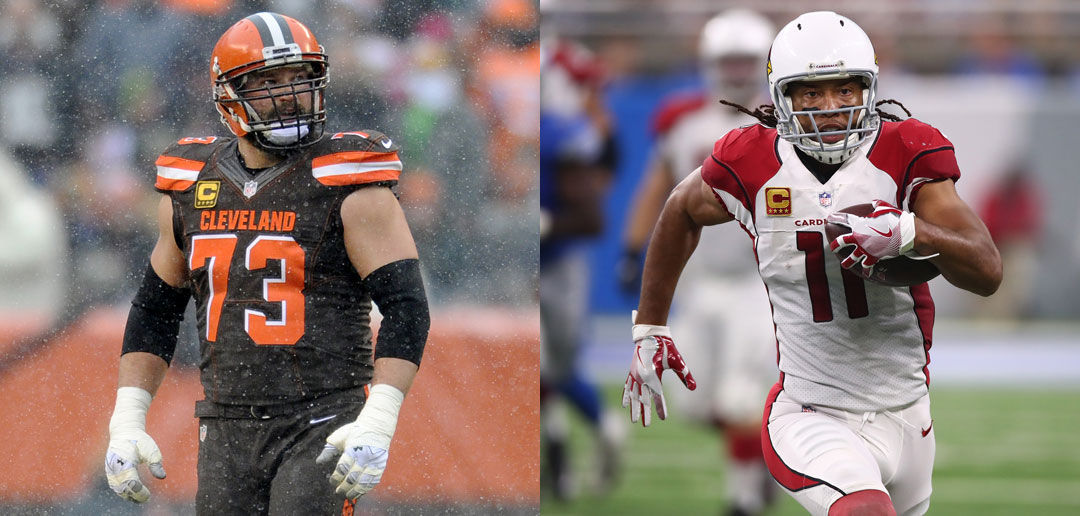The best football player you never noticed just retired.
When he played his best football the very aim was to go unnoticed—that’s how football works when an offensive tackle is doing his job. And Joe Thomas did his job with excellent anonymity for an ignominious football team. (Even the name “Joe Thomas” doesn’t stand out.)
Get our "Top Articles" sent to your inbox weekly.
For eleven years Thomas held down the left side of the Cleveland Browns offensive line as a Hall of Fame-caliber tackle. He blocked for twenty different starting quarterbacks, only one of whom had a winning record with the team and most of whom could barely hack it as backups elsewhere in the NFL. He played for one winning team in his career. Yet Thomas was a star whether measured by metrics or reputation or the naked eye, simply one of the best tackles of his generation in the NFL. Early in March he announced his retirement from the NFL.
Two thousand miles southwest of Cleveland in the suburban sprawl of Phoenix/Scottsdale another all-time great football player excels in relative obscurity for the Arizona Cardinals.
Despite starring at the NFL’s most glamorous and diva-concentrated position since 2004 Larry Fitzgerald remains an oft-forgotten star. He has changed his game over the years from a high flying, acrobatic, jump ball monster to a sure-handed—perhaps the surest hands?—crisp route running, possession receiver who is open even when he’s covered. He has caught passes from sixteen different QBs, many of whom wouldn’t have even lined up for the Cleveland Browns. Unlike Thomas, Fitzgerald’s team has some successful seasons and even one Super Bowl appearance.
Somehow, though, despite the gaudy numbers, the highlight plays, and the metronome-like consistency Fitzgerald is rarely ranked by fans or pundits as one of the all-time great receivers.
As sports fans we love to play the “What If” game. It is fun and it is safe because it is based in nothing more than imagination, speculation, and includes absolutely none of that pesky reality. What if Joe Thomas had played for a perennial playoff team—how would he have been viewed then? What if Larry Fitzgerald could have played even half his career with a QB as good as Kurt Warner? What if Thomas had protected Tom Brady’s or Drew Brees’s blindside? What if Larry Fitzgerald had played in a media market like New York or a football crazed city like Green Bay? What might their respective reputations have been then? Might we appreciate their greatness more—or to state it better, might we have noticed their greatness?
What sets these men apart as competitors and professionals is their lack of obvious ego. In a sports culture where winning is everything —and if you can’t win at least brag louder about your personal accomplishments—Thomas and Fitzgerald are anomalies. In a league where loyalty to a team is rare and staying with a struggling franchise is rarer, Thomas and Fitzgerald are unicorns. They have gone about their business with a clear passion for competition, for excellence, for winning, for their teams, and no amount of adversity or struggle has deterred them. Neither have they broadcast their own successes or complained about their team’s shortcomings. It’s refreshingly weird.
For athletes in any sport or professionals in any field, Joe Thomas and Larry Fitzgerald offer examples to be emulated.
Trade ego for excellence
I’m sure both these men know how good they are and how much better they are than most of their peers. But being better doesn’t seem to be what drives them. Comparing and climbing over others is not their way. Both of them wanted to be the best, but not because they wanted to be recognized as better than a teammate or opponent. They did not exhibit interest in rankings and reputations and the fame that comes with those things. They wanted to be excellent because that is the aim of competition and professionalism. Ego destroys the pursuit of excellence by distracting it from true goals.
Circumstances don’t dictate effort
For all of Joe Thomas’s career and much of Larry Fitzgerald’s they played for badly run teams with little talent around them and less hope of winning. Yet every game they played hard—because that’s what excellence and professionalism look like. Never did word leak about tantrums or loafing or contention in practice or the weight room. In fact, Fitzgerald is known for his off-season training program and taking young players from around the league, especially struggling players, under his wing to show them how it’s done. They didn’t hold out or use poor effort or attitude to leverage their way to a better team (though many people would have found that defensible). They focused. They worked. They did what was expected for the good of the team no matter the expected outcome.
Lead in spite of leadership
It is hard to lead a team when an organization is in shambles, and “shambles” is a generous description of the Cleveland Browns. The Arizona Cardinals have been more up than down in recent years, but there was a time when they were nearly as pathetic as the boys by Lake Erie. The cultures were bad. The strategies were bad. There was constant turnover in the front offices and on the sidelines. Yet Thomas and Fitzgerald provided constant leadership for their peers through effort and attitude and constancy. They could not fix the cultural issues above them (to their great frustration, I am sure) and rather than gripe and go public they worked and worked some more to be the best football players they could be, always leading by example.
Winning isn’t everything—excellence is
Winning is what happens on the scoreboard. Excellence is what happens in workouts, in practice, and on the field. Winning is a result of numerous factors, most of which a single player cannot control. Excellence can be strived after every day by every player. Joe Thomas was not at fault for the Browns’ failure to win. Larry Fitzgerald was not solely responsible for the success the Cardinals achieved. Both of them deserve praise for their relentless pursuit of being excellent. That is the core of a true competitive spirit – not to be better than an opponent or a teammate but to be better than I was yesterday. And that is what Joe Thomas and Larry Fitzgerald exemplified more than anything.














